Reflections on Paradigm Shift in Urban System Reconstruction
Reflections on Paradigm Shift in Urban System Reconstruction作者机构:Institute for Urban and Environmental Studies Chinese Academy of Social Sciences
出 版 物:《Chinese Journal of Urban and Environmental Studies》 (城市与环境研究(英文))
年 卷 期:2019年第07卷第2期
页 面:76-91页
学科分类:08[工学] 081303[工学-城市规划与设计(含:风景园林规划与设计)] 0813[工学-建筑学] 0833[工学-城乡规划学]
基 金:funded by the “Strategic Research on the Promotion of Ecological Civilization Construction and Green Development in a New Era” (Grant No. 2017 YCXZD007), a major innovation project of the Chinese Academy of Social Sciences the Preponderant Discipline Construction Program of “Economics of Climate Change” (2017), Dengfeng Plan of the Chinese Academy of Social Sciences the “Research on Facilitating the Dovetail of the Belt and Road Initiative with the United Nations 2030 Agenda for Sustainable Development” (Grant No. 18VDL005), a major research program supported by the National Social Science Fund of China
主 题:Urban system urban–rural synergies free flow of factors transformation and reconstruction
摘 要:In the era of agricultural civilization, the city size and layout adapted to nature and natural productivity; while in the era of industrial civilization, the constraints of natural productivity were broken by technological means, and the increasing returns to scale have enabled the urban population size to exceed 10 million and the urban population density to exceed 10,000people/km;. Under the paradigm of industrial civilization, the spatial agglomeration of resources is driven by economic rationality. Besides, China’s urban hierarchy has become a barrier and further strengthened the polarization trend of city size, resulting in an urban system in which the cities at higher administrative levels concentrate a lot of resources while suffering from prominent urban diseases, small-and medium-sized cities lack development vitality, and urban and rural areas are separated from each other. The historical experience that the flow of resource factors between urban and rural areas facilitates a relatively balanced spatial distribution of quality resources is worth learning. Under the paradigm of ecological civilization, it is important to harmonize humans with nature in the transformation and reconstruction by pursuing nature-based solutions, and build a low-carbon, resilient, and coordinated urban system.



